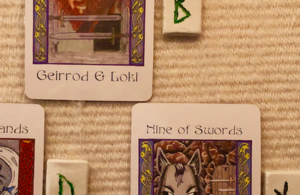My esteemed colleague and dear friend Corvid Longcoat does occasional guest pieces over at Adventures in Woo Woo (a blog devoted to “Chaos Magic and Art”). This week, he wrote about magic, cave art, and magical traditions in a piece titled “All Your Magic Are Belong To Us“. Do click over and read it; I’ll be here when you return.
The entire piece is intriguing (much like Corvid himself). I’ve pulled some favorite bits, and shared them below (with commentary, of course, because—imagine this—I have OPINIONS.)
“Practitioners often romanticise their chosen tradition, or occasionally, another from which they wish to draw.”
Which is a nice way of saying, “make things up entirely”. It’s okay, we all do it, even those whose practices stem from well-documented traditions. All traditions are made up; once upon a time, every practice that is “traditional” now was done for the first time by someone, and adapted by others, until it solidified (or perhaps even ossified) into the current expression.
“The notion that—for example—Candomblé or Vodou with admixtures of Native American, Christian and in some cases Jewish ideas and practices is “the same” as West African religion from pre-colonial times to which we have extremely limited access sounds silly.”
That is not a deterrent for many people, and for some, it’s an attraction.
“I spent some time in Namibia visiting rock art sites, and also visited the Rock Art Research Institute at the University of the Witwatersrand in Johannesburg.”
Jealous!
“Parenthetically, I’d love to put together some curious magicians and gently perform ceremony at a range of these rock sites to see what can be gathered.”
Sign me up! This would be easily done on the quiet, as long as we all act casual about it.
“Magic is a universal human practice which supports incredible variation in practice, cultural context, and orientation. Status seeking seems to be the root of most denigrations of other systems, or assertions about the age and power of one’s own.”
As is abundantly clear in certain books, publications, and blogs. You know who you are. Stop it.
“Rather than a “can’t we all just get along” plea, understanding these roots enables us to appreciate the power and beauty of our own systems, to innovate and adapt them, to appreciate other systems in their uniqueness, and to learn from everyone. That will make us and our systems stronger, more resilient, and more in tune with the oldest transformative magical/art practices known to humans. And that’s got to be good.”
Hear, hear! A creative approach to one’s own practices in light of whatever traditions may exist, and a respectful curiosity regarding others’ practices, seems a reasonable balance.

